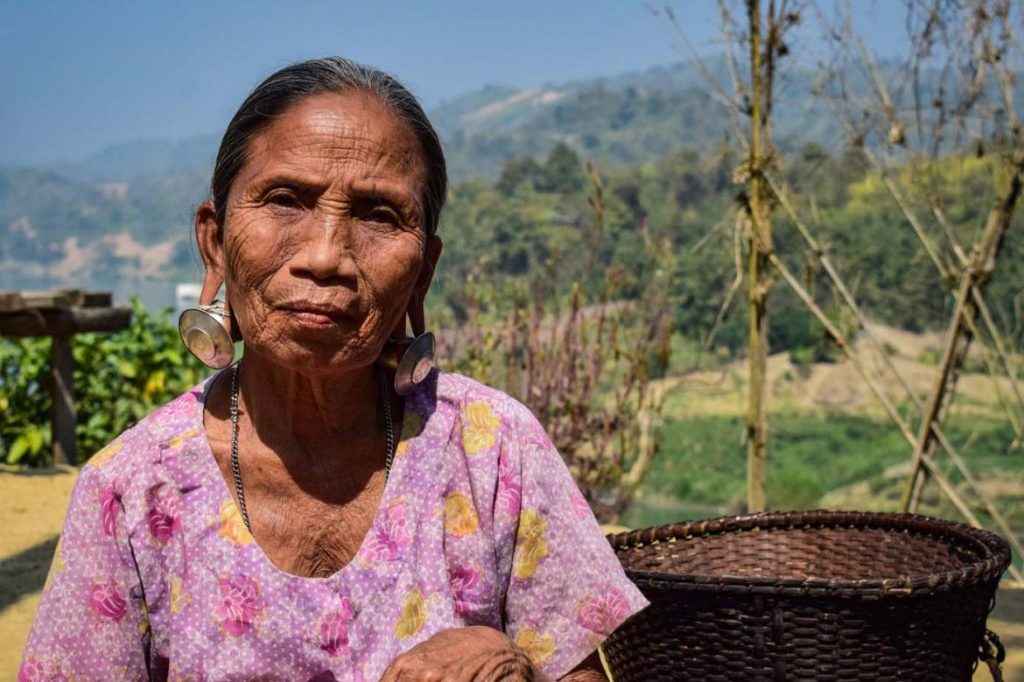Frontier travels to Paletwa in southern Chin State, a township isolated by fighting between the Tatmadaw and the Arakan Army and facing food shortages and growing tensions between the Khumi Chin and Rakhine communities.
By KYAW LIN HTOON | FRONTIER
A DESPERATE situation is emerging for residents of Chin State’s isolated, southern Paletwa Township, where fighting between the Tatmadaw and the Arakan Army has severed the ferry service on the Kaladan River which is the town’s main lifeline with the outside world.
The ferry service, which plies between Paletwa and the central Rakhine State town of Kyauktaw, was suspended in early February because of the fighting. When the service resumed on February 27 five passengers were injured by gunfire and it has been suspended again.
The impact of interruptions to the ferry service was clearly evident when I travelled to Paletwa in mid-February, becoming the first known journalist to visit the beleaguered town in about four months.
It was an arduous journey. It involved taking an overnight bus north from Yangon to Pakokku in Magway Region and then heading west on another bus to Matupi in Chin State, a distance over rolling hills of about 320 kilometres on a tarred road in good condition. The bus service ends at Matupi, where I hired a motorbike for the remaining 270km to Paletwa. The tarred road ended about 14km from Matupi and the rest of the journey was over a bumpy, dirt road through jungle-covered hills with mountains in the distance.
Support independent journalism in Myanmar. Sign up to be a Frontier member.
The bus and motorbike journey from Matupi to Paletwa took three days. Only the first of the two overnight stops was scheduled, on the road between Matupi and Sami, which is about 200km from Paletwa. I had to take the next night’s stopover at Sami because fighting between the Tatmadaw and the AA meant I could not travel further that day.
There were two security checkpoints during the journey, both between Matupi and Sami and only about three kilometres apart. At each checkpoint I had to show my Citizenship Scrutiny Card and was asked to confirm my ethnicity and religion. Presumably, this was because the security forces are trying to prevent AA members from infiltrating into Rakhine via Chin, with all ethnic Rakhine being held under suspicion.
dsc_0113.jpg
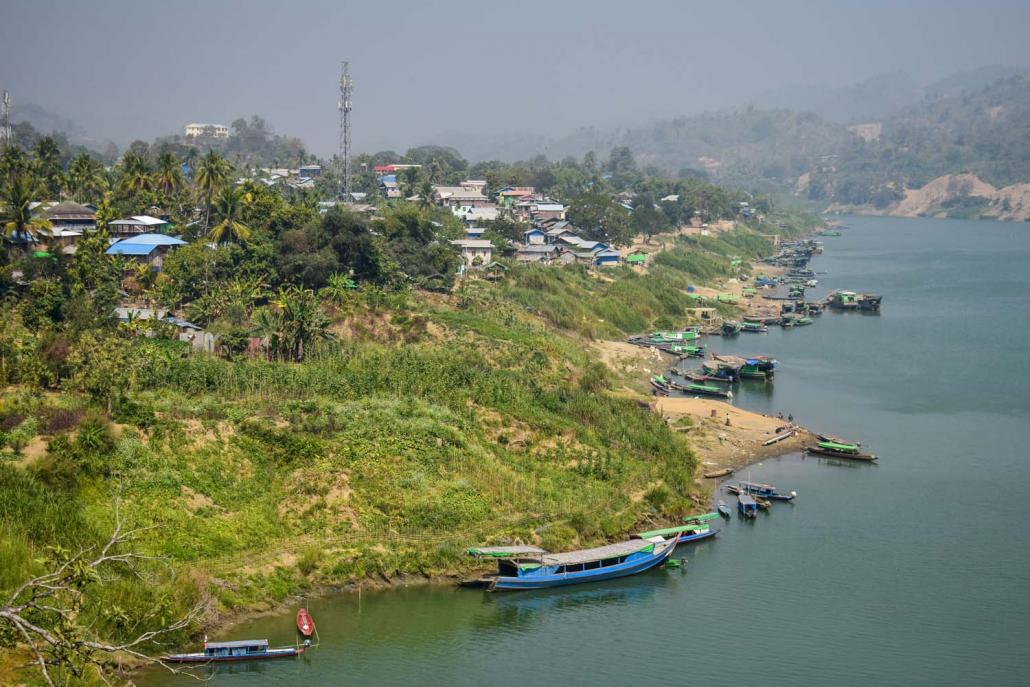
Fighting between the Tatmadaw and the Arakan Army has severed the ferry service on the Kaladan River which is the town’s main lifeline with the outside world. (Kyaw Lin Htoon | Frontier)
A contested land
The town of Paletwa is on the western bank of the Kaladan River. I had assumed the line of bamboo shacks along the river bank, close to the ferry launch, was a squatters’ community until Salai Kyaw Shun, founder of the Raiki Community Development Foundation, a non-government organisation based in Paletwa, explained that they were the homes of people from the surrounding hills who had been displaced by the fighting.
Salai Kyaw Shun introduced me to Salai Shwe Mya, 33, a man from the Khumi Chin community, which is the largest ethnic group in the area. He was embarrassed that his straightened circumstances prevented him from extending the traditional hospitality of his people. The internally displaced people (or IDPs) have to rely on the little support they receive from the township administration.
“The government permitted us to build these bamboo houses and we can stay here temporarily. It provides us with about four pyi [about 10 litres by volume] of rice a month. That’s all we get,” Shwe Mya said.
It’s not only IDPs in Paletwa who are enduring difficult times because of the fighting and the suspension of the boat service on the Kaladan River. Land transport between Paletwa and Kyauktaw halted early last year, and the suspension of the boat service on the Kaladan River has exacerbated the situation. Land transport from the direction of Magway Region is hampered by the poor condition of the road.
“The biggest concern for us is that if this conflict persists, all the people of Paletwa are going to suffer catastrophic food shortages,” said Chin State MP Salai Kan Tint (National League for Democracy, Paletwa-1), whom I met in Matupi, where he has been living as a precaution since Amyotha Hluttaw MP Salai Hawi Tin (NLD, Chin-11) was abducted by the AA on November 3 and held for two months before he was released.
Kan Tint said none of the five Union and state MPs in Paletwa had dared to live in the town since Hawi Tin was abducted. The MP was seized from a river ferry while travelling to Kyauktaw from Paletwa en route to Nay Pyi Taw.
Soon after the abduction of Hawi Tin, the AA, which is fighting for autonomy for the Rakhine people, announced that it regarded Paletwa as part of Rakhine national territory that had been ruled by successive Arakan kingdoms and that the Khumi were a Rakhine rather than Chin ethnic group, reflecting a long-held belief among Rakhine nationalists.
img_20200218_134413_1.jpg
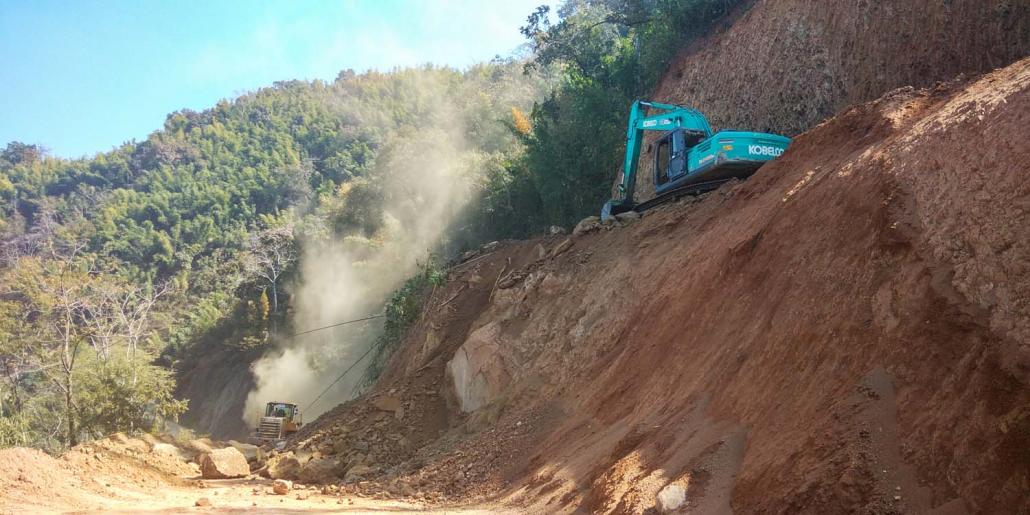
Those braving the road between Sami and Paletwa in southern Chin State are regularly blocked by construction work, which continues despite the conflict. (Kyaw Lin Htoon | Frontier)
On an overseas call in late February, AA spokesperson Khaing Thukha told me that Paletwa was within the historic Rakhine kingdom that had Mrauk-U as its capital.
“This is not something that we started speaking about in recent days,” Khaing Thukha said. “Successive Arakanese revolutionary leaders have talked about it throughout history and successive Rakhine revolutions have also been based in the Paletwa area.”
It’s an argument rejected by Khumi leaders.
“Our customary practices, culture, and language strongly show that we are not the same as [the Rakhine]. We originated in Tibet as did the other Chin tribes and Paletwa has been ruled by us throughout history,” said Salai Win Kyaw, 60, chairman of the Khumi Literature and Culture Association in Sami town, which is in Paletwa Township.
The cairns and other monuments that the formerly animist (but now largely Christian) Khumi erected in their pre-modern history can be found throughout Paletwa Township, Win Kyaw said.
Salai Isaac Khen, a former minister in the Chin State government who resigned in 2018, said there was no evidence of the Khumi people paying tribute to a Rakhine monarch.
Khaing Thukha also alluded to a more practical motive for the AA to maintain a stronghold in Paletwa, whose remote rural tracts and access to unguarded stretches of the border with Bangladesh make it an ideal hideout from the Tatmadaw. “The reason why we are trying to seize that area is because Paletwa is strategic for us,” he said.
However, some prominent members of the Khumi community believe that the AA is acting as an on-field player for China’s geostrategic interests. The armed group still has its headquarters in Laiza, on the Chinese border in Kachin State, more than 1,000km from Rakhine and southern Chin, though the AA’s goal is to establish its HQ in Mrauk-U.
One Khumi community leader, who requested anonymity for reasons of personal safety, said the AA was preventing India from implementing mega projects in Rakhine. He was likely referring to the Indian-backed Kaladan Multimodal Transit Transport Project, aimed at linking Kolkata, the Rakhine State capital Sittwe and Northeast India via the Kaladan River, and costing close to half a billion US dollars.
“It is clear that because of strategic reasons China would like to be the only key player in the Bay of Bengal and the Andaman Sea,” the community leader said.
dsc_0165.jpg
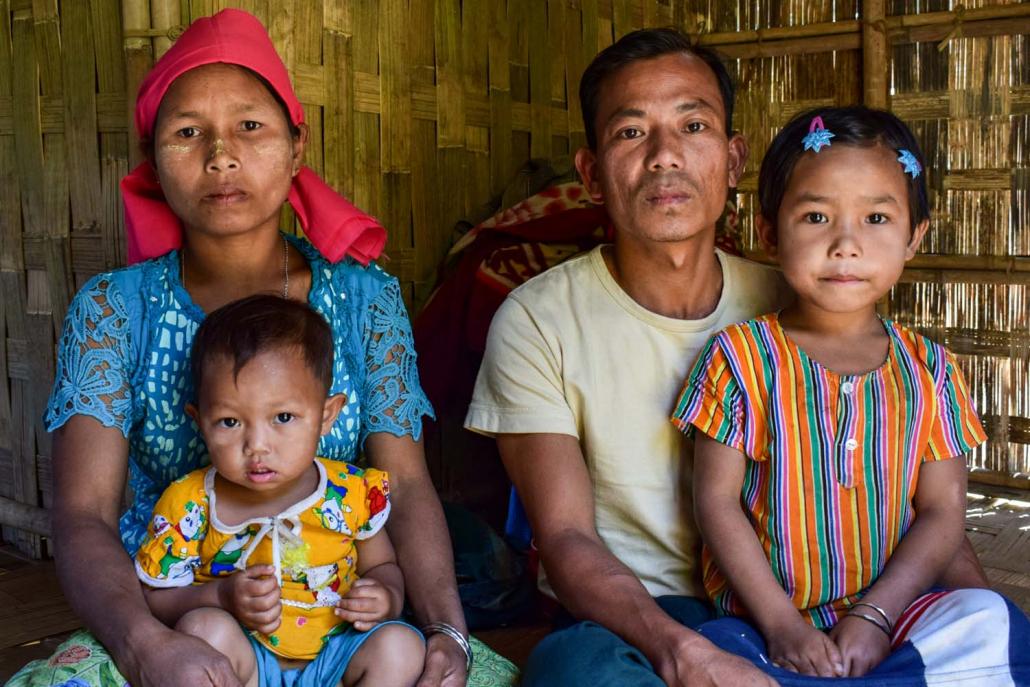
Salai Shwe Mya and his family, who say they were abducted by the Arakan Army, taken across the border to Bangladesh and forced to work for the group. (Kyaw Lin Htoon | Frontier)
Civilians in the crossfire
While I was speaking with Shwe Mya, the displaced villager, the conversation was interrupted by the boom of artillery fire.
Tatmadaw Light Infantry Battalion 289 based on the eastern side of the Kaladan River from Paletwa was firing artillery rounds about every fifteen minutes.
Shwe Mya’s daughters, aged about one year and eight years, barely flinched at the sound of the big guns. The sound of war had become part of their lives.
The family was among 25 families and 53 people who were abducted by the AA in February last year from Kintalin village in Tharyar Kone village tract, in the far north of Paletwa Township, close to the border with Bangladesh.
“They took us to serve as porters,” Shwe Mya said. “All the healthy men younger than 60 had to help carry their baggage and equipment, including weapons and dynamite.”
The villagers and their AA escorts walked through the jungle for three days until they reached a village on the Bangladesh side of the border. After resting they had to move to another village where they were forced to porter for the AA for six months until their release last August, the abducted villagers said. They were transported back to Paletwa town by the Tatmadaw.
Shwe Mya said he lost everything – “all my savings, a well-built house, livestock and crops; the others lost everything, too,” he said.
Shwe Mya was adamant that he did not want to return to his village, because it was unsafe to do so, and that he wants to continue living in the town as an IDP. “My only wish is that responsible officials would arrange permanent housing for us, because where we are living is like a slum,” he said.
dsc_0252.jpg
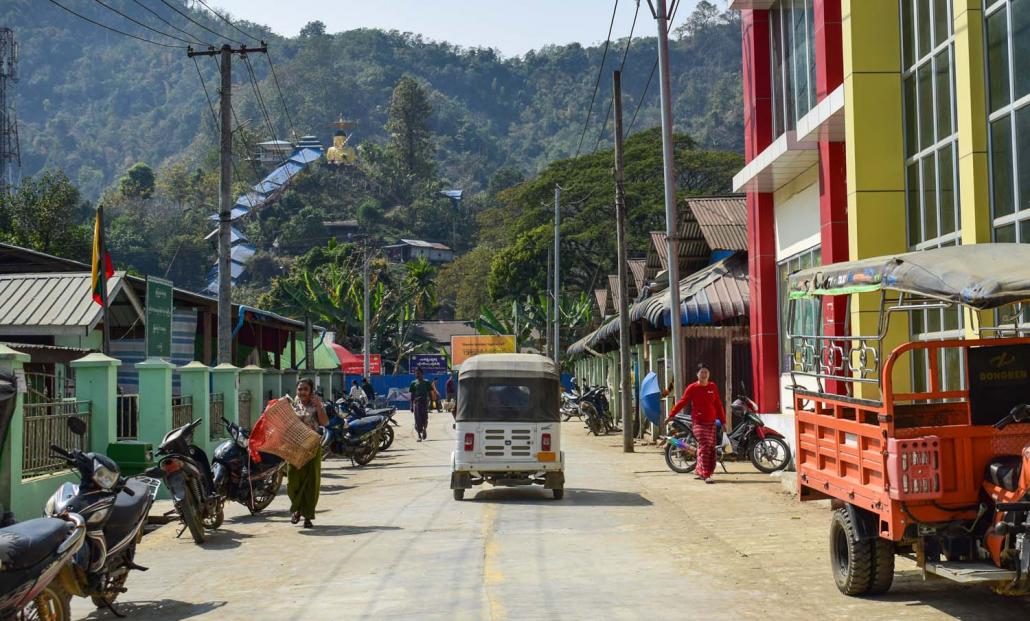
Paletwa town, where the price of commodities has almost doubled because of the closure of the ferry route to Kyauktaw in Rakhine State. (Kyaw Lin Htoon | Frontier)
Meanwhile, all the town’s residents are having to deal with shortages and overpricing. Because most were poor to begin with, many residents fear for their survival. The shortages mean, for example, that it is almost impossible to buy eggs and the price of many everyday goods has increased by at least 70 percent.
Fuel is in very short supply. I was unaware of the shortage during the journey to Paletwa and did not buy extra fuel in Sami. This was a mistake. It took me two days to buy enough fuel in Paletwa for the return journey to Sami and beyond.
The disruptions to everyday life caused by the suspensions of the boat service from Kyauktaw have gone beyond food security and affected education, administration and development work.
About 200 people, including public servants and boarding students who attend school in Paletwa, are stranded in Kyauktaw at the time of writing. Salai Tun Lin, chair of the Paletwa Township Municipal Committee, said road building projects – which would ease access to outside supplies – had been hobbled by delays in delivering materials and equipment.
Communication has been disrupted by the Ministry of Transport and Communication’s decision to impose a mobile internet blackout on Paletwa and townships in Rakhine. Last June, eight Rakhine townships and Paletwa were plunged into digital darkness. More than two months later, services were restored in four northern Rakhine townships and Paletwa and the shutdown continued in the other four townships. In early February, however, the shutdown was re-imposed in the four townships and Paletwa.
The shutdown has meant that it is no longer possible to transfer money on the internet or to use an ATM. However, resourceful locals who are Wave Money customers have found a way around the ban. They are asking Wave Money agents to call friends or relatives in Sittwe, which is outside the mobile internet blackout, or other areas of the country and arranging transfers by proxy.
Khumi leaders desperately want the AA and the Tatmadaw to negotiate an end to the fighting.
dsc_0234.jpg
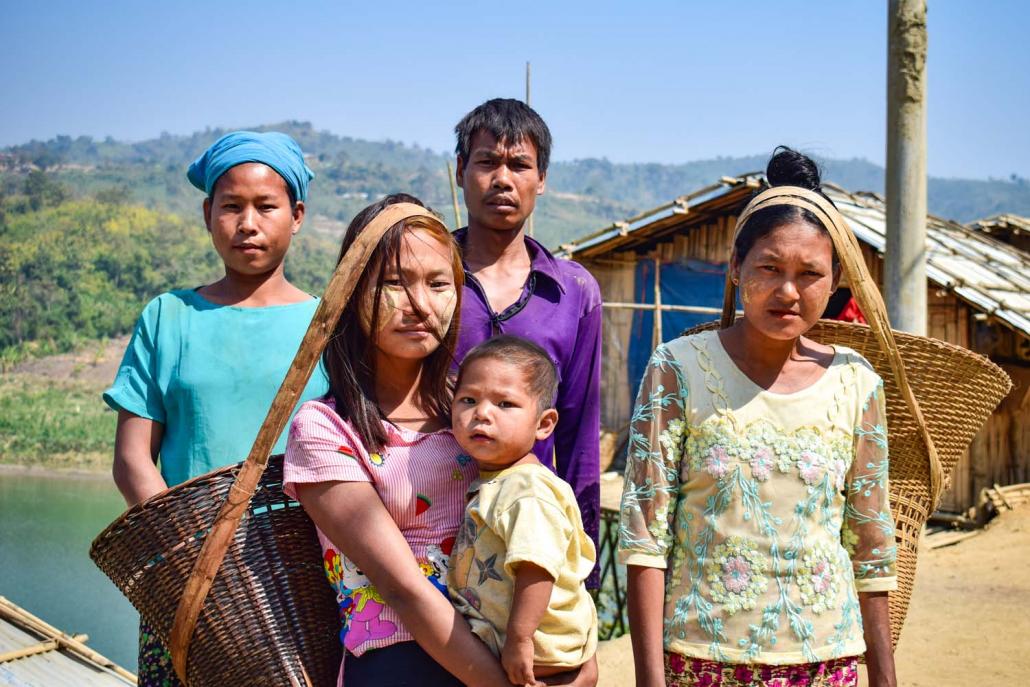
Khumi Chin displaced from remote villages in the far north of the township find shelter in a shanty settlement in Paletwa town. (Kyaw Lin Htoon | Frontier)
“My creed is peace; peace is the only way,” Isaac Khen told me. “Indeed, in Paletwa, not only our Khumi Chin are in trouble, but other people including the Rakhine are in trouble.”
The Raiki Foundation says there were more than 2,200 IDPs in Paletwa Township in December, with 60 people reported as missing as a result of fighting that has left about a dozen people dead, some of them from landmine explosions.
Some Khumi worry that the situation could result in heightened tensions with the Rakhine, who they say comprise about 10 percent of the population in the town and in Sami.
Salai Soe Tan, an NLD youth leader in Sami, who is Khumi, told me that the Khumi were very patient but a feeling was growing in the community that they could no longer trust the Rakhine.
“Such a situation could trigger violence between the Rakhine and the Khumi Chin,” he said.


